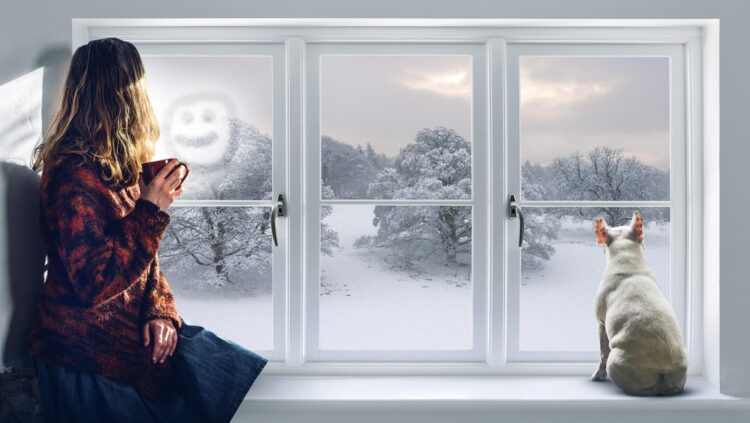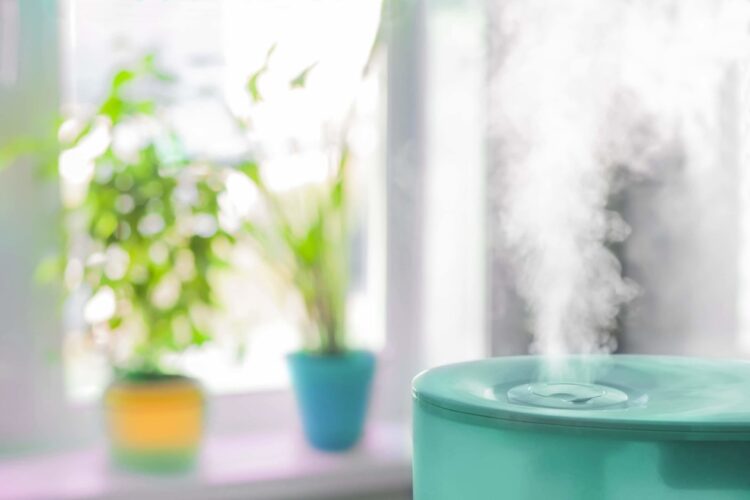Do you feel like your home has been unusually dry this winter? You’re not alone – many homeowners who live in cold regions face the same issue. Colder weather leads to lower humidity levels inside our homes.
But why is this happening in your home and what measures can you take to improve the air quality in your living space? In this blog post, we’ll explore the science behind low humidity levels during the winter months and offer practical tips on how homeowners can increase moisture in their houses.
Winter air causing your home to feel dry? Here’s why humidity is low in winter and some things you can do to mitigate it.
Check out this post for more information on whole-house dehumidifiers, and how to get one for your home.
Why Humidity is Low in Winter ─ The Science Behind It

It’s no secret that our environment can feel drier in the winter months than it does at other points in the year. Fortunately, there’s a bit of science behind this phenomenon.
Cooler air holds less water vapor than warmer air and as temperatures decrease in winter, air molecules move slower and do not have enough energy to hold onto moisture as tightly – resulting in drier air around us.
Additionally, with less daylight hours, many plants (that aren’t hibernating) shut down their transpiration processes which further reduces the amount of water vapor found in the environment compared to summer months when plants are actively ‘breathing’ moisture into the atmosphere.
The Problem With Low Humidity in Winter
Low humidity levels in winter can cause a lot of problems for both people and their environment.
Dry air can leave skin feeling tight, itchy, and irritated. It can interfere with our respiratory health too since low humidity reduces the natural efficacy of our bodies’ mucous membranes which play an essential role in filtering out pollutants from the air we breathe.
But it’s not just humans that suffer! Low humidity during winter significantly increases the risk of home fires due to the dry atmosphere, because fire ignites more easily in dry conditions. The dry weather also erodes materials faster causing surfaces such as wood to become brittle and worn down quicker than if they were under normal levels of humidity.
Fortunately, there are some simple solutions – using humidifiers in the home is a great way to counteract low indoor humidity, bringing comfort and peace of mind to all who share in it.
How to Increase Humidity Levels in Your Home During the Winter

Many homeowners who wonder why humidity is low in winter, often ask if there’s anything that can be done to solve it. Thankfully, there is! Here are some things you can do to resolve the issue:
1. Use a humidifier
This is the number one way to increase humidity levels in your home. Humidifiers come in a variety of types and sizes and can be used for small rooms or large spaces. Be sure to clean your humidifier regularly to prevent the growth of mold and bacteria.
2. Bring plants into your home
Plants are a great way to increase humidity levels in your home as they release water vapor into the air through their leaves. Be sure to choose plants that are suitable for indoor conditions and do not require too much sunlight or water.
3. Cook on the stovetop instead of using the oven
Cooking on the stovetop instead of using the oven is another great way to increase humidity levels in your home. When you cook on the stovetop, steam is released into the air, which will help to raise the humidity level

4. Hang wet towels or clothes in your home
Hanging wet towels or clothes in your home is another great way to increase humidity levels. The evaporation from the towels or clothes will help to raise the humidity level in your home. Note that this is a quick fix, and not necessarily a permanent one. Just be sure not to hang them near any heat sources, as this can cause mold growth.
5. Place bowls of water around your home
Another easy and quick way to increase humidity levels is to place bowls of water around your home. The water evaporates into the air and increases the humidity level in your home. Be sure to empty and refill the bowls as needed.
Conclusion – Why is humidity low in winter?
Humidity levels in the winter season tend to be lower than other times of the year due to various factors. These causes can include cold air temperatures outdoors, indoor heating, and lack of vegetation.
The main result is that your skin and environment can become drier. To combat this, it may be necessary to invest in products such as humidifiers that can help maintain moisture within your home.
To choose the best humidifier for your living space, contact a professional technician. They will help assess your needs and provide you with the best options for your home.
 Hi Boox Popular Magazine 2024
Hi Boox Popular Magazine 2024



